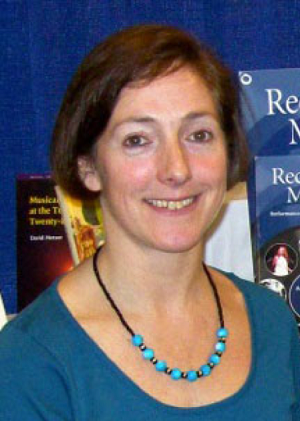A short interview with Professor Amanda Bayley

We caught up with Professor Amanda Bayley ahead of our forthcoming Eco-creativity: Music, Religion, Activism Conference, on 13th November 2020.
Visit our conference website for more details, if you would like to dip in for a session
She kindly answered a few questions about her present collaborations and research. Prof Bayley will host a roundtable discussion on Eco-creative Pedagogies at the conference.
[Maria] Would you like to tell us about your current research and collaborations?
[Amanda] Well, one of the projects I've been working on for the last five years as a co-investigator is with Michael Ellison, who's the principal investigator at Bristol University.
He's a composer and the project is called ‘Beyond East and West: Developing and Documenting an Evolving Transcultural Musical Practice’. It’s funded by the European Research Council. My ethnographic research has been documenting and observing workshops, rehearsals and performances taking place in Turkey. Fortunately, most of the research trips had happened before everything closed down in March but the second opera has had to be postponed to 2022. Our book proposal on Turkish Makam Instruments and Voices in Contemporary Music was accepted by Routledge and they invited us to set up a new book series on Transcultural Musical Practices. So, our book will launch that series.
[Maria] That’s very interesting.
[Amanda] Well, what's interesting about the project is how I’ve been able to observe, and even participate (on viola) in, the rich collaborations, dialogues and musical experiments that have taken place between musicians from different traditions. In the workshops, instrumentalists and singers from oral traditions have been teaching classically trained, note-reading musicians and vice versa. This has enabled us to observe practices across cultural boundaries and traditions.
[Maria] I was just thinking about how your research relates to the conference on eco-creativity. And I was thinking that transcultural encounters are spaces that are bound to encourage creativity – did you find that?
[Amanda] Yes. And that's something that's a development of my work, observing composers and performers in various cross-cultural collaborations. I'm over halfway through another European funded project, its acronym is IRiMaS: Interactive Research in Music as Sound. And that's actually developing software for analysing music from the perspective of sound rather than from notation. That’s also particularly relevant to explore in different cultural contexts and musical traditions as well.
[Maria] That's fantastic.
[Amanda] And I should also mention in connection with that, my work with Stevie Wishart, the composer/performer who is on our panel for the Eco-creativity conference, because she's very interested in different kinds of notation. And we're working on exploring that in the context of nature sounds and nature music. That's what she does as a composer. Last year, she was commissioned to write two pieces based on birdsong, one of which was The Last Tango? based on the Argentinian hooded grebe, now an endangered species. It links in with the eco-creativity ideas and my research considering aurality as a transcultural literacy and as an eco-literacy. In fact, we're presenting at the Institute for Musical Research symposium on Saturday [31st October] on Music Studies on a Damaged Planet. Our talk is on ‘Eco-composition: music of our time’.
[Maria] That's exciting! I know you were going to do some research in Africa this year.
[Amanda] Yes. Well, I haven't been to Africa, in fact. But I was planning to go twice this year, on one occasion to Zimbabwe, and on a separate trip to Kenya, where there was going to be a conference at one of the partner institutions of our [Bath Spa University] Global Academy of Liberal Arts Network. And unfortunately, obviously, neither of those happened with Covid-19... But instead, I've been working online with people in South Africa and Zimbabwe planning future research projects. In particular, a project based on ‘Trees of Hope’, which you'll hear a bit about in the panel session at the Eco-creativity conference.
[Maria] Thank you so much!
October 2020
Request your prospectus
![]()
Explore our qualifications and courses by requesting one of our prospectuses today.
